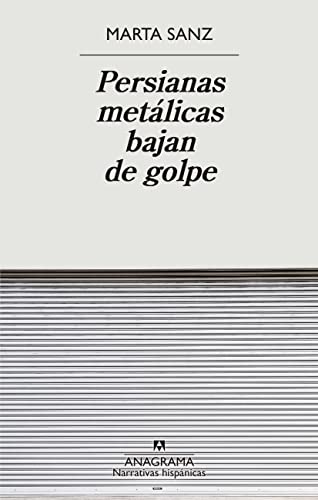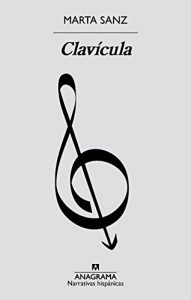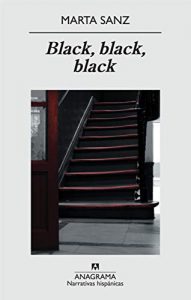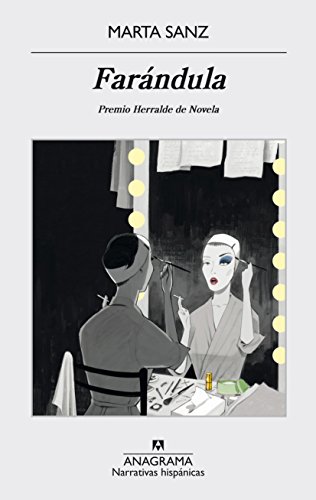With its own bibliography in continuous growth and in which we find a bit of everything between genres of fiction or non-fiction, Martha Sanz She is one of the essential authors of current Spanish narrative. She cannot be missed along with other literary pens with carats such as Bethlehem Gopegui o Edurne portela.
The question to address any narrative proposal with the solvency of Marta Sanz is that mastery of the tools towards sufficiency, plus the ingenuity and creativity to balance everything towards that always surprising set.
Any new book by Marta Sanz has that I don't know what surprise. The gift of writer with great craft who can dare to tell us the most unexpected story, from a review of the noir genre, to the essay, through contemporary plots.
But if there is one characteristic that ties everything together in this author, it is that feeling of freshness, of daring in form and substance. Putting her way of seeing the world into account through her characters, Marta Sanz bets because precisely they, the protagonists of her scenes, move with an overwhelming truth, with the feeling that when the plot begins, the general masquerade ends . To be grateful in post-truth times.
Top 3 recommended books by Marta Sanz
Metal shutters snap down
My taste for the dystopian has that something of a forecast of the end of the world. Or at least that feeling that humanity is shaping up towards a fatality as a self-fulfilling prophecy between ideas of overpopulation in the world. Ideas where power seems always prepared to perpetuate itself at all costs, at any price. Hence, stories like this powerfully call my attention from novel approaches in scenarios already visited by a multitude of authors from Orwell or Huxley.
This novel places us in the future world of Land in Blue (Rhapsody). There, a mature woman lives with Flor Azul, a drone through which she holds conversations with her friend Bibi, who is actually the voice of an actress. The woman, lonely and forgetful, lives separated from her daughters, Selva and Tina, each one protected and watched over by another drone: the disenchanted Obsolescence and the adolescent Cucú.
The woman inhabits a world governed by the virtual, the parcel companies and the programs of the heart. A world ruled by exploitation, police repression and fear of disease and death, in which thanatopractors preserve corpses from rot. The soundtrack of this city-country-world is that of the metal shutters that come down suddenly, one of the leitmotifs that gather around themselves, forming loops and waves, in this dystopian buffoonery. But dystopian like the hopeful dystopias à la Vonnegut: with their little birds that warn of leaking firedamp...
Full of winks and references (from high culture to television gossip, including all kinds of pop paraphernalia), the novel is a futuristic pamphlet, a cyborg symphony, a cry of protest, a choreography of desolation, a more modern vanitas than postmodernism, and, above all, a neo-romantic novel of drones in love with women whom they care for and spy on, reverse Coppelias, sentimental vampires, contempt for the god of the algorithm, dreams, mirrors, enchantments and revolutions: spring can emerge from the darkness buoyed by the most unpredictable beings.
Clavicle
If we understand literature as a wise exercise in putting black on white who we are, this autobiographical "novel" manages to convey the most sincere sensation of our psyche peeking out at the events that assail it.
The ultimate reason to live is to die. And under this essential contradiction, the fact of being a hypochondriac acquires the sense of constant lucidity, of knowing what all this is about. Then there is the language, the form. Such preceding arguments point to profound metaphysics. And yet language is the perfect tool to naturalize everything after its due restructuring.
The short but explosive sentences, the accepted axioms that melt like sea foam, the symbols, the daily haikus, everything points to an estrangement that strips reality to be seen in its rawness, without disguises. And everything happens in a simple way. , from the perception of the author herself, subjected to the usual third degree that every human being imposes on himself, exposing himself to his fears and doubts at the most unexpected moment.
Black, black, black
In crime novels there are usually always two branches, that of the case itself and that of the investigator. Because no crime seems to have enough hook if it is not opposed to the hell of the investigator on duty.
And Marta Sanz saw the opportunity and thought is to decompensate the matter. Because Zarco, his detective, is in charge of the murder of Cristina Esquivel, right ..., but the most important issue is his personal relationship with his ex-wife, Paula, because what Paula and Zarco were able to experience, before he openly manifested himself as homosexual, he could give rise to a thousand pending issues in that great lie that his marriage must have been.
They would marry for something, no doubt. And from their constant calls and rich conversations, we understand that they are two soul mates at their respective opposite poles, oddly enough, although we certainly never abandon the whole case of the murdered young woman. Because after contacting Olmo, a young man with whom Zarco would have more than just a conversation, the diary of his mother, Luz, is discovered, as apparently harmless as it is surprisingly Machiavellian to put her neighborhood in order, in the best way possible.
Other recommended books by Marta Sanz
Farándula
Where life is a hurricane that can wipe out everything. Where everything that happens is the end and trigger of a new storm. All calm is a hurricane eye in a world ruled by impossible hopes, egos, desires and life to the fullest.
The actress Valeria Falcón is a friend of Ana Urrutia, an old glory who has nowhere to fall dead. His decline overlaps with the emergence of Natalia de Miguel, a young aspirant who falls in love with the cynical Lorenzo Lucas. Daniel Valls confronts his success, his money and his glamor with the possibility of his political commitment. Charlotte Saint-Clair, his wife, takes care of him like a geisha and hates Valeria, Daniel's great friend.
A stroke, the theatrical montage of Eva in the nude and the signing of a manifesto will discover the reader: A story about the fear of losing one's place. On the resistance to metamorphosis and its convenience - or not. On what it means to be reactionary today. On language changes that reflect changes in the world. On the loss of prestige of culture and its possibility of intervening in reality. On the devaluation of the artist's image. And its precariousness. About the public.
On generational change and aging. About the rich actors who sign manifestos and the poor actors who don't sign anything because nobody takes them into account. On the paradox that only when someone is anonymous does he begin to serve something in his community. On charity as evil and charity galas as a reproductive loop of injustice. On whether the system can be fought from within the system. An edge, funny, sad, pointed, urgent text. It's show business.





Today I personally met Marta Sanz, we had a meeting at EMMA, a place (trembling because of the danger of disappearing due to the policies of the CM) where especially women from a complicated neighborhood like El Pozo del Tío Raimundo, we can meet, help , train, support ...
It has been an interesting, exciting, fun talk. We have thought together, exchanging opinions.
Enjoying a kind talk, so necessary (kindness in these turbulent times)
I recommend reading it and getting to know it. A pleasure. Thanks.
Thanks for sharing your impressions, Charo.